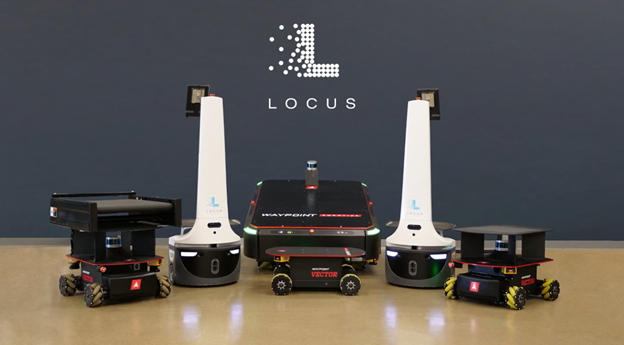|
Listen to this article  |

Locus Robotics, a leading provider of autonomous mobile robots (AMRs) based in Wilmington, Mass., today acquired fellow AMR developer Waypoint Robotics. Waypoint brings multiple form factors and heavy-duty payload capabilities to the table, opening up new markets to Locus and expanding deployments with existing customers. Financial details of the acquisition weren’t disclosed.
For now, Waypoint Robotics will maintain its branding and headquarters in Nashua, New Hampshire. Waypoint, formerly known as Stanley Robotics, has been a bootstrapped company since it spun out of Stanley Innovation. Becoming part of the Locus family gives Waypoint needed resources in all aspects of its business.
Locus has raised approximately $305 million since it was founded in 2014 and is valued at more than $1 billion. Earlier in 2021 after closing a $150 million Series E round, Locus said it had 4,000 AMRs out in the field and 40-plus customers. It also recently announced an expanded partnership with DHL.
Locus has done all of this with just one AMR form factor, the LocusBot, with limited payload capacity. Waypoint’s Vector and MAV3K industrial-strength AMRs offer up to 600 lb. and 3000 lb. payload capacities, respectively. Waypoint’s AMRs also feature omnidirectional wheels that make them well-suited for certain challenging environments.
“The acquisition of Waypoint Robotics will accelerate our product roadmap,” said Locus Robotics CEO Rick Faulk. “We will be introducing product offerings that address our customers’ urgent and growing needs worldwide including serving industries with use cases requiring robots to handle larger, heavier payloads.”
How the Locus-Waypoint deal came together
Jason Walker, CEO and co-founder of Waypoint Robotics, said the company came to a consensus earlier in 2021 that it was time to raise money. “There is such a thing as getting muscled out of the market,” he told The Robot Report. “The bigger other companies get, the harder it gets for us to get our messaging out to customers.”
Walker said Waypoint solved the problems – product maturity, technical capabilities, customer value – it needed to solve for customers to deploy in a bigger way. However, Walker said Waypoint lost deals with potential customers who voiced concerns about Waypoint’s small company size.
“We’re really excited that we’ve instantaneously resolved all those questions from customers,” Walker said about being acquired by Locus. “My sales philosophy is to eliminate the objections. We’re excited about getting rid of those from customers who loved our products but were reluctant to go in.”
“We’d grown organically, but relative to Locus, for example, we’re a lifestyle company,” said Walker. “In a lot of ways, we were faced with a situation about how to take this to another level. We were open to either funding or acquisition. If we took money, it had to be the right type of money from people who could add value. And being acquired had to be by a group that was exceptional. And Locus jumped at this opportunity.”
Waypoint became the fourth AMR company acquired in just the last five months. The chart below recaps some of the more notable AMR acquisitions throughout the years.
12 notable warehouse-focused AMR acquisitions
| Acquirer | Acquired | Amount ($M) | Date | Story |
|---|---|---|---|---|
| Locus Robotics | Waypoint Robotics | — | 9/20/21 | Story |
| ABB | ASTI Mobile Robotics | — | 7/20/21 | Story |
| Zebra Technologies | Fetch Robotics | 290 | 7/1/21 | Story |
| JASCI Software | NextShift Robotics | — | 5/4/21 | Story |
| Shopify | 6 River Systems | 450 | 9/9/19 | Story |
| Teradyne | AutoGuide Mobile Robots | 58 | 10/21/19 | Story |
| Amazon | Canvas Technology | 100+ | 4/11/19 | Story |
| Teradyne | Mobile Industrial Robots | 272 | 4/26/18 | Story |
| Omron | Adept | 200 | 9/16/15 | Story |
| KUKA | Swisslog | 357 | 9/25/14 | Story |
| Amazon | Kiva Systems | 775 | 3/19/12 | Story |
| Adept | MobileRobots | — | 6/14/10 | Story |
ROS-based AMRs
Walker has often talked about standards for AMRs. In fact, he discussed it at length when he appeared on The Robot Report Podcast. Both Locus and Waypoint built their AMRs on top of the robot operating system (ROS), the popular open-source software frameworks for robotics development. This makes things easier, for example, if one customer wants to deploy AMRs from both companies in a facility.
“This might look lucky now, but it was deliberate,” said Walker. “We tried to leave ways to communicate and integrate with our robots open and easy.” Fact that locus uses a ROS-based robot … will talk to our robots the same way they talk to a locus robot.
Both Locus and Waypoint are also involved in the mobile robot standard from MassRobotics. The new initiative enables AMRs from multiple vendors to integrate and work together seamlessly to support safe and efficient operations in global factories, warehouses, distribution and fulfillment centers.
“One exciting feature is that they are interoperable with our award-winning LocusBot,” said Faulk. “We are also committed to similar interoperability and communication with other robotics systems and IoT devices to further expand use cases in facilities.”
One thing to keep an eye on is the different sales approaches from these companies. Locus uses a robots-as-a-service (RaaS) business model where clients pay for the service delivered by the solution, instead of paying to acquire a capital asset. Waypoint has used a classic capital expenditure business model. Waypoint clients buy the AMRs and own them. This enables the client to customize the payload on the AMR and to deploy it into any application it chooses.
Faulk and Walker will be guests on this week’s The Robot Report Podcast. So stay tuned for more coverage of this acquisition.
Credit: Source link


Comments are closed.